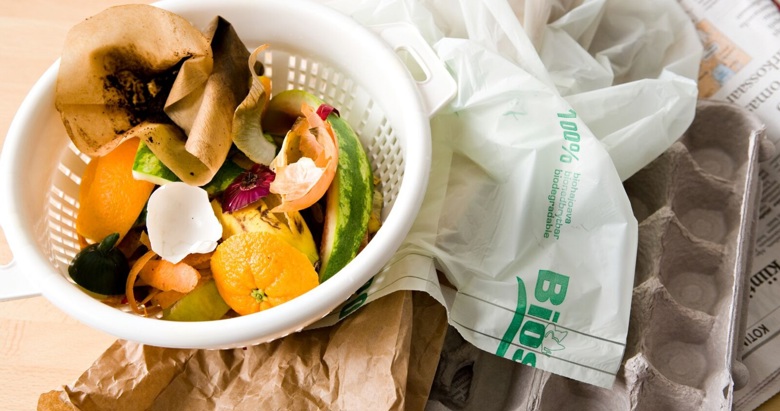Biowaste

Biowaste is decomposing and compostable food and kitchen waste. Easily decomposed fibrous materials can also be sorted into biowaste.
Yes, please
- fruit and vegetable peels
- leftover food
- fish bones, bones
- solidified grease
- egg cartons
- coffee and tea grounds, tea bags and filter papers
- soft paper, such as kitchen towels, napkins and tissues
- plant parts and wilted flowers
- small amounts of raking waste
- wood-based litter from pet cages (e.g. sawdust and pellets)
No, thank you
- Ordinary plastic bags. These belong in plastic packaging recycling.
- Food packages. When empty, they belong in metal, plastic, cardboard, or glass packaging recycling, depending on the material.
- Large quantities of apples or other seasonal fruits. See instructions.
Please don’t pour grease down the drain.
Put liquid grease in the mixed waste bin in a sealed container.
You can absorb leftover cooking oil with a paper towel and place the towel in the biowaste.
Do this
-
1
Choose a biowaste bin that suits your household size.
-
2
Pack biowaste into a compostable bag, preferably a paper bag.
You can get a free biowaste bag from things like a flour bag, cereal box, or newspaper. You can also use store-bought paper bags or compostable bioplastic bags. Do not use regular plastic bags, as they do not decompose.
-
3
Let food waste cool and dry before placing it in the bag.
Place an empty egg carton at the bottom of the bag to absorb moisture. Pour any liquids down the drain.
-
4
Empty the biowaste bin every few days.
Close the biowaste bag and take it to your property’s biowaste container. Biowaste does not need to be packed in your own compost.
Where to take biowaste?
Biowaste must be sorted in all residential properties. The options for sorting and handling biowaste are as follows:
- HSY biowaste container
- Personal composter intended for food waste
- Sharing a biowaste container or composter with nearby neighbours
For other properties, biowaste collection is mandatory if more than 10 kilograms of biowaste is generated per week.
Composting on the property,
Submit a composting notification,
Biowaste for properties with 1 to 4 apartments,
We produce soil and biogas from biowaste
Sorting biowaste is important because it is the only way to recover its nutrients and renewable energy. We produce biogas and nutrient-rich, organic fertiliser from biowaste at our treatment plant in the Ämmässuo eco-industrial centre.